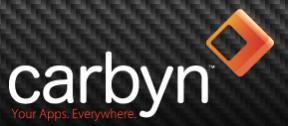Whilst apps are old news and Flash-based utilities are showing their age, HTML 5 is on the rise, going from strength to strength every day. Soon an incoming project from Facebook, labelled ‘Spartan’, is set to bring an HTML 5 platform to the enduring social networking hub in the near future.
Platforms are all well and good, but why settle for a platform when you can have the whole damn boat/opera house/construction site/ thing you would expect platforms to be part of?
Launching at TechCrunch’s Disrupt event, new startup endeavour Carbyn has pretty much laid down the HTML 5 gauntlet – creating an entire operating system based on the web language. The Carbyn OS works simply by opening a web browser window and logging into the service, starting the OS-within-a-window-within-an-OS program created by the Carbyn team.
The service was initially demoed on an Apple iPad and a RIM Blackberry Playbook, but extended Smartphone functionality is apparently in the works.
The Carbyn OS allows users to pin apps to the start screen, creating a traditional panel of available applications users are familiar with. Existing HTML 5 apps are easily portable to the OS, in less than half an hour according to the Carbyn team, whilst specialist apps can of course be created from scratch from a custom SDK developed by the team.
Carbyn’s OS differs from many app transit and storage utilities, chiefly due to its ability to store, run and manage apps within one domain, allowing for dynamic multi-tasking within a single browser window – closing a Carbyn app doesn’t close the operating system, meaning that the service’s cloud-based approach allows apps to constantly communicate with each other for the duration of the Carbyn session.
One of Carbyn’s main attractions is that the system is designed to accommodate every HTML5 app available, as long as it’s compatible with the service’s wrapper. This means that the service can in theory accommodate apps previously only available from competitive brands and corporations, such as Google and Facebook, and will allow users to have a non-company specific home for all their apps. It’s like the app equivalent of Switzerland, there isn’t an allegiance to one specific group or name.
Currently the Chrome Web store, Google’s HTML 5 app transit platform, only runs on personal computers and the Chrome browser, meaning that whilst Carbyn can receive all the apps available there (within the boundaries of the law of course) and be accessed anywhere, whilst the Chrome Web store is restricted to a certain platform and contains a more ‘scrutinized’ array of apps.
“Google wants to promote their own products, we’re agnostic,” says Carbyn co-founder Jaafer Haidar.
Haider also anticipates the same kind of problems will hit the new Facebook app project too, anticipating the the Facebook service will be too closely affiliated with the parent enterprise.
“Hopefully Facebook doesn’t try to pull a Microsoft and create some proprietary hooks for HTML5,” Haider says.
After reaping the benefits of a successful implementation stage, Carbyn’s plan from here on in is simple; partner with key app developers who feel restricted by other services, promote their service with recognizable apps and profit by taking a cut or creating affiliate deals.
Partner, promote, profit – sounds like a competent strategy from a previously self-funded company, and will hopefully earn the 5 Canadians of Carbyn some greatly needed investment capital. Best of luck, boys.

